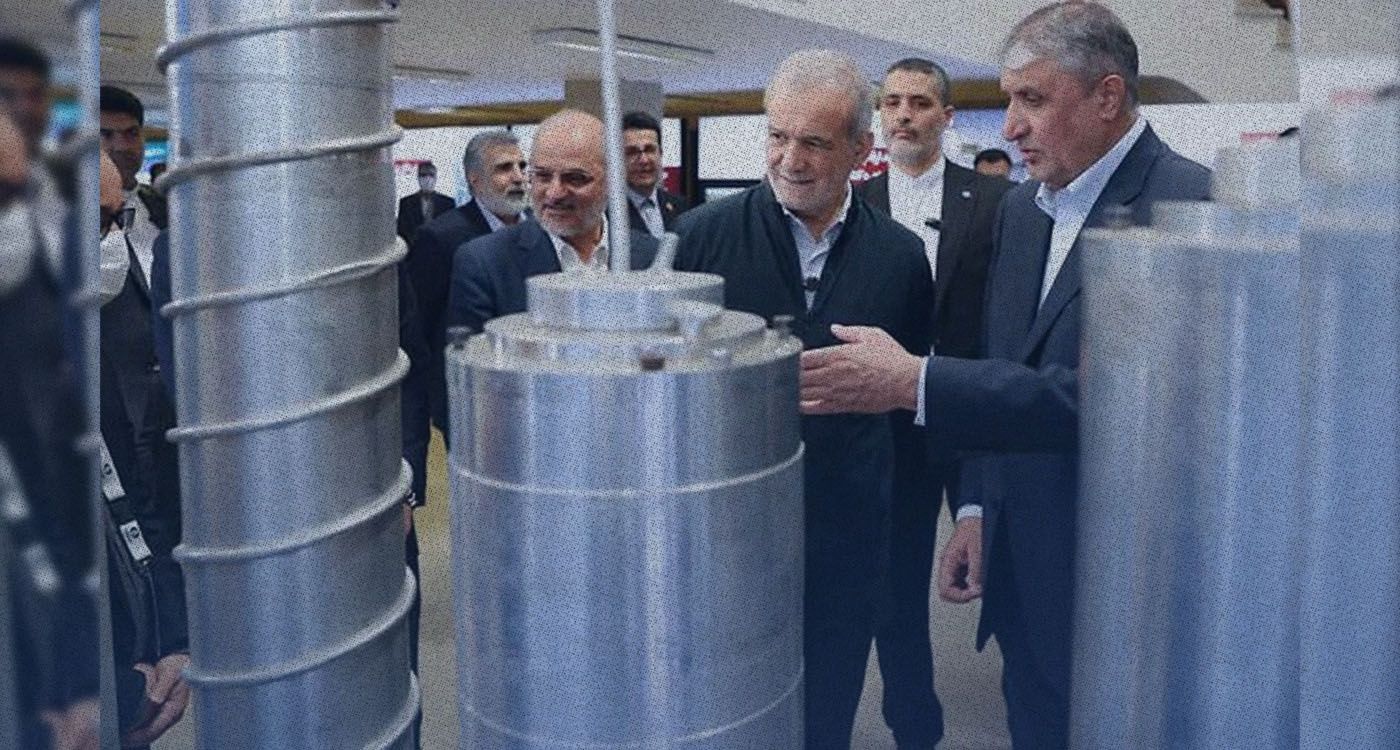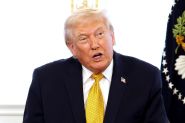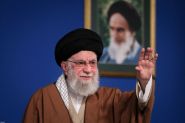- Home
- Middle East
- Iran and the IAEA: How Far Will Tehran Push Its Standoff?

A photo distributed by the Iranian Presidency shows President Massoud Pezeshkian (2nd right) and the head of the Atomic Energy Organization of Iran, Mohammad Eslami (right), on “National Nuclear Technology Day” in Tehran, April 9, 2025. ©AFP
On Wednesday, June 25, Iran’s parliament approved a motion to suspend cooperation with the International Atomic Energy Agency (IAEA). According to Iranian state television, 221 lawmakers voted in favor, with only one abstention and none opposed.
The decision comes amid growing tensions between Tehran and Western powers. It follows an IAEA resolution earlier this month that criticized Iran for its lack of cooperation on the nuclear issue.
“The IAEA, which failed to even mildly condemn the attack on Iran’s nuclear facilities, has compromised its credibility on the international stage,” said Parliament Speaker Mohammad Bagher Ghalibaf, as quoted by state television following the vote. He added that Iran’s Atomic Energy Organization “will suspend its cooperation with the IAEA until the security of the country’s nuclear sites is guaranteed.”
But what does this decision actually mean within Iran’s political system? Is it immediately enforceable? And what are its implications?
The Supreme Leader’s Decisive Role
First, it’s important to note that a parliamentary motion is not necessarily binding. It primarily reflects a political stance, aimed at influencing the government and sending a strong message to the international community.
In Iran, the Parliament (Majlis) can pass laws and exercise oversight over the government, but a motion does not carry the weight of enforceable legislation.
Iran’s political system is built on a complex structure in which religious authority, embodied by Supreme Leader Ali Khamenei, dominates the republican institutions. Within this framework, a parliamentary motion must be approved by the Guardian Council, which ensures its compliance with the Constitution and Islamic law, before being reviewed by the Supreme National Security Council, responsible for overseeing nuclear and defense policy.
The final decision, however, rests with the Supreme Leader; without his approval, no strategic measure can be carried out. If all these steps are fulfilled, the government may then reduce or sever cooperation with the IAEA.
A Longstanding but Strained Cooperation
Iran has cooperated with the IAEA since the 1950s, long before the 1979 Islamic Revolution, when the country launched its civilian nuclear program with Western support. However, this cooperation grew more complex from the 2000s onward, following revelations about Iran’s clandestine nuclear activities.
In 2003, an Additional Protocol to the Nuclear Non-Proliferation Treaty (NPT) was signed, allowing the IAEA to carry out expanded inspections on Iranian soil.
In 2015, Iran also agreed to the Joint Comprehensive Plan of Action (JCPOA), commonly known as the Iran nuclear deal, which aimed to regulate Iran’s nuclear program through added transparency commitments, all under IAEA supervision.
When Donald Trump unilaterally withdrew from the agreement in 2018, Iran gradually eased its compliance with the JCPOA, while remaining a member of the NPT.
Is Suspension Legally Possible?
Since 1970, Iran has been a member of the NPT; it is prohibited from developing a nuclear bomb while guaranteed the right to use nuclear energy for civilian purposes.
Under Article III of the treaty, Iran signed a safeguards agreement with the IAEA, allowing the agency to inspect its nuclear facilities and verify that its activities are exclusively peaceful. The IAEA thus plays a crucial monitoring role, mandated by international law and strengthened since 2003 by the voluntary – but not ratified – application of the Additional Protocol, which grants expanded access to certain sites.
From a technical standpoint, Iran can restrict its cooperation with the agency by refusing certain inspections, disabling IAEA cameras, blocking access to specific sites or withholding nuclear data.
In fact, it has done so on several occasions, notably in 2006, 2010, 2021 and 2023. Such actions do not necessarily violate the NPT, provided that the fundamental safeguards formally remain in place.
Legally, the country may reduce its cooperation but cannot completely sever it without formally withdrawing from the NPT. Article X of the treaty allows a state to withdraw following a three-month notice, citing events that threaten its supreme interests. However, the situation has not yet reached that stage, unlike North Korea, which withdrew from the NPT in 2003.
The Fallout of an Effective Suspension
If cooperation with the IAEA were suspended, Tehran could expel inspectors, halt the transmission of technical reports and disable international monitoring equipment. Such a move would represent a serious breach of international norms, with significant consequences for regional stability and global security. Diplomatically, it would further isolate Iran and could trigger a tightening of economic sanctions. From a security standpoint, the decision would heighten concerns about nuclear proliferation in the Middle East and might provoke military responses from the United States, Israel and Gulf countries. Finally, it would undermine ongoing negotiations and complicate any future cooperation.
The IAEA’s Limited Yet Crucial Role
The IAEA plays a central role in overseeing the global civilian nuclear program through its inspections and reports. However, its influence is constrained by geopolitical realities, notably the dominant role of the US, which leverages the agency as a diplomatic tool. Israel, which is not a member of the IAEA, also exerts significant regional pressure in coordination with Washington.
Ultimately, sovereign states – especially through the UN Security Council, where the five permanent members with veto power (the US, Russia, China, the United Kingdom and France) sit – decide whether to enforce resolutions and sanctions.
And Yet... Negotiations Continue
Despite ongoing tensions, talks between the US and Iran, which began some time ago, remain on the agenda. They are scheduled to resume next week, President Trump announced Wednesday on the sidelines of the NATO summit in the Netherlands. His envoy, Steve Witkoff, told Fox News in an interview that both parties have started discussions – both direct and through intermediaries – aimed at reviving negotiations on Iran’s nuclear program. He described the talks as “promising,” reaffirming that “the United States demands that Iran under no circumstances resume uranium enrichment.”
According to Trump, the US strikes on Sunday, June 20, targeting the Fordow, Natanz and Isfahan sites have “completely paralyzed Iran’s nuclear capabilities,” setting them back by “several decades.”
Read more



Comments